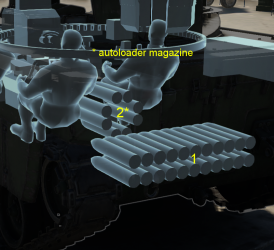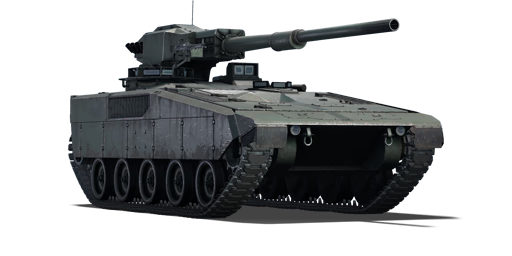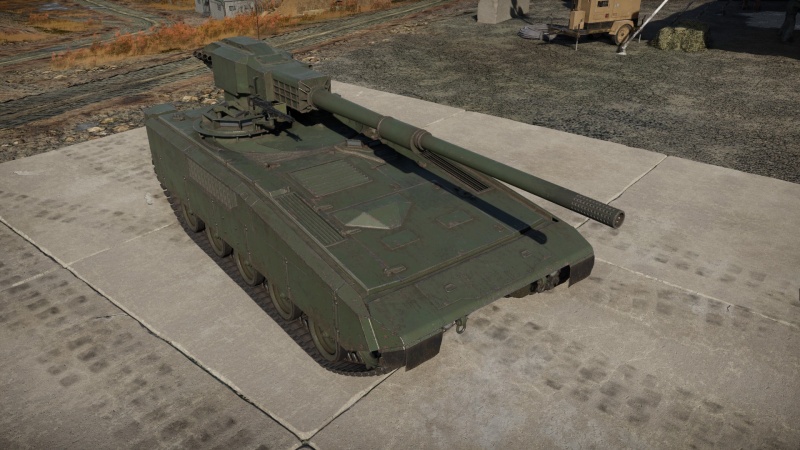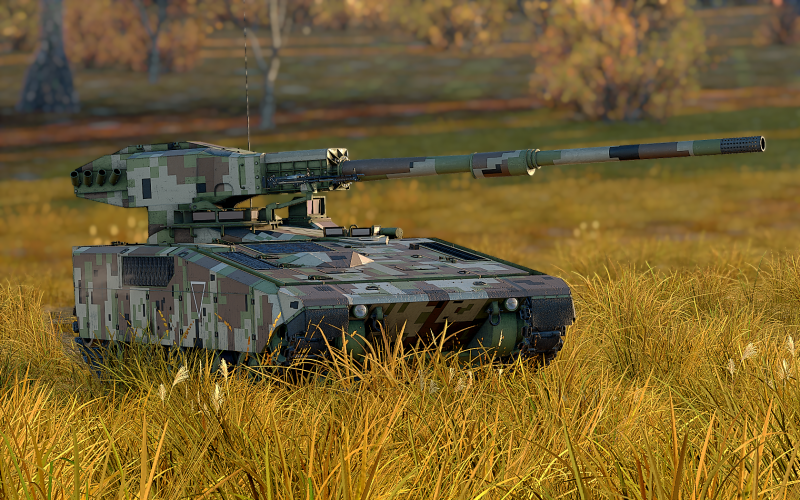AGS
Contents
Description
The usage of the M551 Sheridan airborne/reconnaissance tank in combat in places like Vietnam enabled the United States to gather experience on what they like or didn't like about the lightweight armored vehicles in combat operations. This allowed the United States to establish the baseline requirements when opening the Armored Gun System (AGS) program to find a replacement to the M551 for their airborne forces. One contender in this contest was Teledyne Continental Motors (TCM), which produced their own AGS design in the early 1980s. Their design was submitted and was distinguished for its unmanned turret when compared to competitors like the CCVL. However, the CCVL ended up winning the AGS program and the TCM AGS design was not adopted. TCM continued to utilize their AGS design for export sales attempt after the program's conclusion.
Introduced during Update "Winged Lions" as a reward for the 2021 Operation W.I.N.T.E.R. event, the AGS presents a unique platform for American operators with its unmanned turret on top. The sheer small size of the turret sticking on top of the hull makes this vehicle extremely survivable in a hull-down position as enemies would struggle to incapacitate the vehicle due to the tiny target the turret presents, and the right attack angle needed to damage the critical components and crew in the AGS hull. With a -10 degree gun depression, the AGS can be quite useful in hull-down positions against enemies as well. That said, if the AGS gets targeted by anything equipped with autocannons and above, they will quite easily shred it apart. So the AGS is best used once an ideal hull-down location can be found that hides the hull but exposes the turret, but don't plan to stay very long lest artillery or a bomb finds the AGS' position.
General info
Survivability and armour
The Teledyne Light Tank is primarily made out of Aluminium alloy 7039 all around. The sides are covered by two sets of composite screens. However, it's important to note that the TCM AGS is a light tank and its survivability is suboptimal.
Armour type:
- Aluminium alloy 7039
| Armour | Front (Slope angle) | Sides | Rear | Roof |
|---|---|---|---|---|
| Hull | 38.1 mm (25°) + 12.7 mm (59-77°) Front glacis 25.4 mm (82°) Upper glacis |
25.4 mm Top 25.4 mm Bottom |
25.4 mm (11°) | 25.4 mm |
| Turret | 25.4 mm Gun mantlet | 25.4 mm | 25.4 mm | 25.4 mm |
Notes:
Mobility
| Game Mode | Max Speed (km/h) | Weight (tons) | Engine power (horsepower) | Power-to-weight ratio (hp/ton) | |||
|---|---|---|---|---|---|---|---|
| Forward | Reverse | Stock | Upgraded | Stock | Upgraded | ||
| Arcade | 81 | 17 | 19.1 | 930 | 1,145 | 48.69 | 59.95 |
| Realistic | 73 | 16 | 531 | 600 | 27.8 | 31.41 | |
Modifications and economy
Armaments
Main armament
| 105 mm M68A1 | Turret rotation speed (°/s) | Reloading rate (seconds) | ||||||||
|---|---|---|---|---|---|---|---|---|---|---|
| Mode | Capacity | Vertical | Horizontal | Stabilizer | Stock | Upgraded | Full | Expert | Aced | Autoloader |
| Arcade | 30 | -10°/+16° | ±180° | Two-plane | 38.1 | 52.7 | 64.0 | 70.8 | 75.3 | 5.00 |
| Realistic | 23.8 | 28.0 | 34.0 | 37.6 | 40.0 | |||||
Ammunition
| Penetration statistics | |||||||
|---|---|---|---|---|---|---|---|
| Ammunition | Type of warhead |
Penetration @ 0° Angle of Attack (mm) | |||||
| 10 m | 100 m | 500 m | 1,000 m | 1,500 m | 2,000 m | ||
| M456A2 | HEATFS | 400 | 400 | 400 | 400 | 400 | 400 |
| M393A2 | HESH | 127 | 127 | 127 | 127 | 127 | 127 |
| M774 | APFSDS | 372 | 370 | 365 | 358 | 351 | 343 |
| M833 | APFSDS | 395 | 392 | 387 | 381 | 375 | 369 |
| Shell details | ||||||||||||
|---|---|---|---|---|---|---|---|---|---|---|---|---|
| Ammunition | Type of warhead |
Velocity (m/s) |
Projectile mass (kg) |
Fuse delay (m) |
Fuse sensitivity (mm) |
Explosive mass (TNT equivalent) (kg) |
Ricochet | |||||
| 0% | 50% | 100% | ||||||||||
| M456A2 | HEATFS | 1,174 | 10.5 | 0.05 | 0.1 | 1.27 | 65° | 72° | 77° | |||
| M393A2 | HESH | 732 | 11.2 | 0.1 | 4 | 4.31 | 73° | 77° | 80° | |||
| M774 | APFSDS | 1,509 | 3.4 | - | - | - | 78° | 80° | 81° | |||
| M833 | APFSDS | 1,485 | 3.7 | - | - | - | 78° | 80° | 81° | |||
| Smoke shell characteristics | ||||||
|---|---|---|---|---|---|---|
| Ammunition | Velocity (m/s) |
Projectile mass (kg) |
Screen radius (m) |
Screen deploy time (s) |
Screen hold time (s) |
Explosive mass (TNT equivalent) (g) |
| M416 | 732 | 11.6 | 16 | 5 | 25 | 50 |
Ammo racks

| Full ammo |
1st rack empty |
2nd rack empty |
Visual discrepancy |
|---|---|---|---|
| 30 | 9 (+21) | 1 (+29) | No |
Notes:
- Shells are modeled individually and disappear after having been shot or loaded.
- Rack 2 (autoloader magazine) is a first stage ammo rack. It totals 8 shells.
- This rack gets filled first when loading up the tank and is also emptied first.
- As the AGS is equipped with an autoloader, manual reloading of the gun is not possible.
- Once the autoloader magazine has been depleted, you can't shoot until the loader has restocked the autoloader with at least one shell.
- The restocking time is longer than the normal reload time of the gun. Take this into account when playing.
- Simply not firing when the gun is loaded will move ammo from rack 1 into rack 2. Firing will interrupt the restocking of the ready rack.
- The depletion order at full capacity is: 2 - 1.
Machine guns
| 7.62 mm M60D | ||||
|---|---|---|---|---|
| Mount | Capacity (Belt) | Fire rate | Vertical | Horizontal |
| Pintle | 1,000 (100) | 651 | -10°/+20° | -6°/+180° |
| 7.62 mm M240 | ||||
|---|---|---|---|---|
| Mount | Capacity (Belt) | Fire rate | Vertical | Horizontal |
| Coaxial | 3,000 (200) | 941 | - | - |
Usage in battles
This tank is a flanker, first and foremost. Your gun is worse than the average in effectiveness, you only win fights if your enemy fails entirely, and you need weak spot hits to destroy enemies frontally. Your best advantage is your turret, if you can find positions where the enemy can only hit your barrel, enemies attacking you with APFSDS will be nearly unable to destroy you, and enemies have to swap to high explosive ammunition or bring in close air support to remove you.
Use the AGS's excellent mobility to get to key points or flank the enemy and try to get into hull-down areas, when attacking enemies keep in mind that you don't have that much armour and your low crew count will get you easily knocked out by a single shot. When flanking, hit the enemy with a side shot and move around them; if they have a pintle-mounted MG or autocannon, use side scraping so you don't get penetrated. If you get spotted, you have smoke grenades at your disposal: use them and pull back to allied tanks.
If you must take an engagement, push an enemy moving towards your left, using your forward engine and transmission to potentially take hits for you, while also moving your driver out of harms way. You must also be greatly careful about ammo expenditure, if you are caught in a fight and spend your entire autoloader, you have to wait a substantially long time to get ammo back. You cannot reload if the autoloader is empty, and as such, you would not be able to fight back at all. It is best then to disengage and bide time until your ammo is replenished.
Pros and cons
Pros:
- Unmanned turret grants a better survivability when hull-down
- Effective mobility
- Good gun depression
- Laser rangefinder
- 5 second reload is faster than most competing tanks
Cons:
- Little to no armour, with frontal weak spots
- Gun, while passable, needs to hit weak spots on most medium tanks it faces frontally, and can easily net poor damage results.
- Low-calibre machine guns are of little use
- Its 1st generation thermal sights are vastly inferior to those of other encountered vehicles, such as the T-72AV (TURMS-T)
- Low zoom optics make some long-range engagements difficult, if not impossible
- Ammo rack is placed far into the back of the vehicle, being hit while on the move can prove accidentally fatal
- Gun only reloads from ready rack, if the ready rack is empty gun cannot reload until a shell is loaded into the ready rack, thus making extended engagements difficult
History
The Teledyne AGS was developed by Teledyne Continental motors in the 1980s and competed with the CCVL and the Stingray light tank to get the contract for the US Army's Armored Gun System program which was looking to replace the M551. The program was seeking to provide air-mobile infantry with a tank that was transportable by a C-130 Hercules cargo aircraft, and lasted from 1980-1992. Development of the tank began in 1982, and the first prototype chassis was built in December 1983, followed by the turret in 1984. The turret and chassis were first assembled together in April 1985 and were shown at the US Army Armor Conference at Ft. Knox. In 1992, the AGS program concluded with the CCVL, which was re-designated XM8, winning the contract. The Teledyne AGS continued to be marketed by Teledyne until 1996, however it had no buyers.
Media
- Skins
- Videos
See also
- Other vehicles with unmanned turret
External links
| USA light tanks | |
|---|---|
| LVT | LVT(A)(1) · ○LVT(A)(1) · LVT(A)(4) |
| M2 | M2A2 · M2A4 · M2A4 (1st Arm.Div.) |
| M3/M5 Stuart | M3 Stuart · M3A1 Stuart · M3A1 (USMC) · M5A1 · M5A1 TD · ▃Stuart VI (5th CAD) |
| M22 Locust | M22 |
| M24 Chaffee | M24 · M24 (TL) |
| M18 Hellcat | M18 GMC · M18 "Black Cat" · Super Hellcat |
| M41 Walker Bulldog | M41A1 |
| M551 Sheridan | M551 · M551(76) |
| M3 Bradley | M3 Bradley · M3A3 Bradley |
| Wheeled | M8 LAC · T18E2 · M1128 · M1128 Wolfpack |
| Other | M8A1 GMC · T92 · T114 · HSTV-L · CCVL · XM8 · XM800T · AGS |






